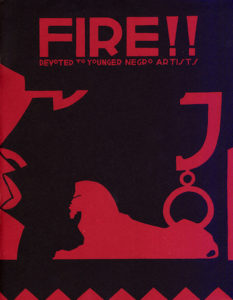
*The first publication of Fire!!, the magazine, is celebrated on this date in 1926.
This Black literary publication exerted a marked impact on the Harlem Renaissance. It was read in the 1920s and early '30s despite its demise after the first issue (November 1926). The idea for the apolitical Negro literary journal was conceived in Washington, D.C., by poet Langston Hughes and writer and graphic artist Richard Nugent. The two, along with an editorial board comprising Zora Neale Hurston, Gwendolyn Bennett, John Davis, and Aaron Douglas, selected the novelist Wallace Henry Thurman to edit the publication.
Thurman solicited art, poetry, fiction, drama, and essays from his editorial advisers, as well as from such leading figures of the New Negro movement as Countee Cullen and Arna Bontemps. Responses to the magazine ranged from minimal notice in the white press to heated contention among African American critics. Among the latter, the senior rank of intellectuals, such as W.E.B. Du Bois, tended to dismiss it as self-indulgent, while younger figures reacted enthusiastically.
Financial viability quickly proved unattainable, and several hundred undistributed copies met an ironic fate when the building they were stored in burned to the ground. After it published one issue, its quarters burned down, and the magazine ended. Fire!! was conceived to express the Black experience during the Harlem Renaissance in a modern and realistic fashion, using literature as a vehicle of enlightenment. The magazine's founders aimed to reflect the shifting attitudes of younger African Americans.
In Fire!!, they explored edgy issues in the black community, such as homosexuality, bisexuality, interracial relationships, promiscuity, prostitution, and color prejudice. Langston Hughes wrote that the name was intended to symbolize their goal "to burn up a lot of the old, dead conventional Negro-white ideas of the past ... into a realization of the existence of the younger Negro writers and artists and provide us with an outlet for publication not available in the limited pages of the small Negro magazines then existing."
The magazine's headquarters burned to the ground shortly after it published its first issue, ending its operations. Fire!! was plagued by debt and encountered poor sales. The Black public did not receive it well because some felt the journal did not represent the sophisticated self-image of blacks in Harlem. Other readers found it offensive for many reasons, and it was denounced by black leaders such as the Talented Tenth, "who viewed the effort as decadent and vulgar." They disapproved of content relating to prostitution and homosexuality, which they considered degrading to "the race." They also thought many pieces published were a throwback to old stereotypes, as they were written in the slang and language of the Southern vernacular.
They felt the "undignified" contents reflected poorly on the black race. As an example, the critic at the Baltimore Afro-American wrote that he "just tossed the first issue of Fire!! into the fire." But The Bookman applauded the journal's unique qualities and its personality. Although this magazine had only one issue, "this single issue of Fire!! is considered an event of historical importance." The magazine featured a diverse range of literary genres, including novellas, essays, stories, plays, drawings, illustrations, and poetry.